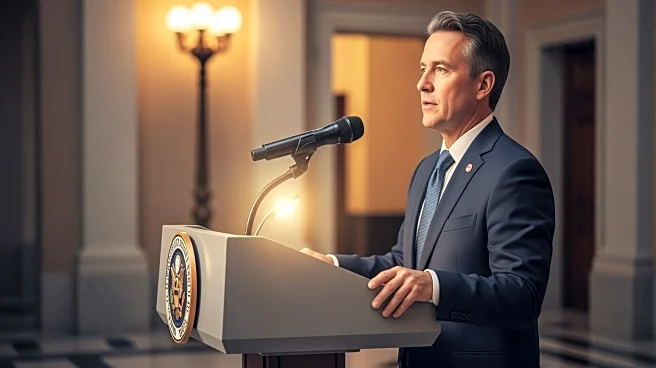What's Happening?
Speaker of the House Mike Johnson has expressed support for the GOP's clean continuing resolution (CR) as the government shutdown extends into its third week. Johnson stated that he does not have a strategy
to negotiate with Democrats, emphasizing the importance of passing the House-passed funding bill. The shutdown has led to significant criticism from congressional Democrats, particularly those representing Maryland and Virginia, where many federal workers reside. President Trump has indicated that some Democratic programs cut during the shutdown may not return, and a list of these programs is expected soon. The Office of Management and Budget (OMB) is working to ensure paychecks for federal law enforcement officers and military personnel despite the shutdown.
Why It's Important?
The ongoing government shutdown has significant implications for federal employees and the broader U.S. economy. With federal workers facing uncertainty regarding their paychecks, the shutdown could lead to economic strain in regions heavily reliant on government employment. The decision to cut certain Democratic programs could have long-term impacts on public policy and social services. The lack of negotiation strategy from Speaker Johnson suggests a prolonged impasse, which may exacerbate the shutdown's effects. The administration's focus on maintaining military and law enforcement pay highlights the prioritization of certain sectors over others during this fiscal crisis.
What's Next?
As the shutdown continues, the administration plans to release a list of Democratic programs that will be cut. The OMB is preparing to ride out the shutdown without conceding to Democratic demands, potentially leading to further reductions in the federal workforce. The Pentagon's decision to use available funds to pay military personnel may face legal challenges from Democrats. The ongoing stalemate in negotiations suggests that the shutdown could become one of the longest in U.S. history, with significant political and economic consequences.
Beyond the Headlines
The shutdown raises ethical questions about the prioritization of certain government functions over others. The decision to cut Democratic programs could lead to debates about the role of government in providing social services and the impact of political ideology on public policy. The administration's approach to managing the shutdown may influence future budget negotiations and the balance of power between political parties.









